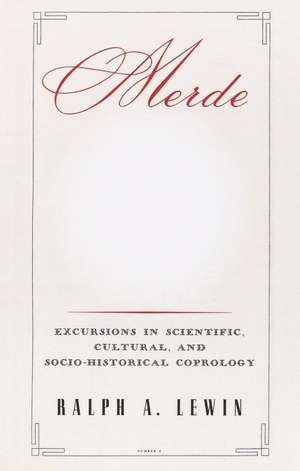Merde: Excursions in Scientific, Cultural, and Socio-Historical Coprology
Autor Ralph A. Lewinen Limba Engleză Paperback – 30 apr 1999
History, biology, anthropology, culture, animal behavior--all of these are the real subjects of Merde. Why can some animals do it on the run, and others can't? Why does camel dung make good fires? What are the fascinating stories of the dung beetles?
Myths and legends, physical features, health and disease, uses for construction and as fertilizers--even nutritional values!--Ralph Lewin writes about them all in the most ingratiating and sophisticated and yet scientific way. Merde is also full of personal adventures and observations, as well as anecdotes and examples.
The scattered literature on this subject is voluminous, but until now no one has perused and compiled it all and given it a personal touch, so to speak. It will be hard not to talk about this treasure trove of a book after you've finished it--or perhaps even when you're in the middle of it.
From the Hardcover edition.
Preț: 88.25 lei
Nou
Puncte Express: 132
Preț estimativ în valută:
16.89€ • 18.35$ • 14.20£
16.89€ • 18.35$ • 14.20£
Carte disponibilă
Livrare economică 31 martie-14 aprilie
Preluare comenzi: 021 569.72.76
Specificații
ISBN-13: 9780812992519
ISBN-10: 0812992512
Pagini: 208
Dimensiuni: 140 x 216 x 12 mm
Greutate: 0.27 kg
Editura: Random House
ISBN-10: 0812992512
Pagini: 208
Dimensiuni: 140 x 216 x 12 mm
Greutate: 0.27 kg
Editura: Random House
Notă biografică
Ralph A. Lewin is professor of marine biology at the Scripps Institution of Oceanogra-phy at the University of California at San Diego. He has also taught at several marine-biology labs, was an instructor and special lecturer at Yale, and has lectured on algae, marine microbiology, and biotechnology in various countries, including England, France, Japan, China, and Brazil. His previous publications, several hundred of them, have been mostly academic and technical. He lives in La Jolla, California.
From the Hardcover edition.
From the Hardcover edition.
Extras
TERMINOLOGY AND CULTURAL ATTITUDES
The word "science," meaning knowledge, and the word "shit," from the Old English scitan, both apparently derive from the same ancient Indo-European root, as does the Greek word from which scatology is derived. (The modern Greek expression Skata sta moutra sou is not recommended for polite society.) For cowpats, however, the Greeks had a special word, bolita. The parallel between the German words unterscheiden (to distinguish) and ausscheiden (to excrete) supports this initially implausible derivation. Shit is one of the few English words that have identical forms in the present tense, past tense, and past participle. (The past tense is also shit, not shat. A shat was a weight unit for silver in ancient Egypt.) Some foreigners learning English have to make a special effort to pronounce the word "sheet" with a long vowel, otherwise their remarks are likely to be misconstrued. (An equally embarrassing mistake may be made by foreigners learning Japanese who fail to use a long vowel for the first syllable of kuso, reverie.) Back in 1300, the London street Sherbourne Lane gained the familiar appella-tion "Shitteborne Lane" because of its exposed sewage. The Greek word, like the related Anglo-Saxon root "scat," has given rise to the formal name for a stinking indole derivative, skatole, one of the major components contributing to the smell of mammalian feces, as well as certain species of evil-smelling ants. It is interesting to note that the Latin singular noun faex was rarely used in Roman times (except in reference to the lees of wine), and is apparently never employed in English, where we use only the plural, faeces, or as in American spelling-feces. Swahili, likewise, has only the plural word mavi; in a logical language, like Esperanto, either the singular, feko, or the plural, fekoj, is equally acceptable.
In medieval times, dung was often referred to as "gore," but this meaning has now gone out of use. In the King James version of the Bible, the accepted euphemism for defecation is "covering one's feet." This is generally accomplished in what Englishmen refer to as "public conveniences" or "water closets," i.e., W.C.s; in France this term is often contracted to "le water." In America such a place is designated as a "rest room" or "powder room" where one may go to "wash one's hands." Informally it is often referred to as the "john," reminding us that in Elizabethan England it was called the "jakes" (cf. Jacques). In Britain it is commonly called the "loo" (cf. French l'eau); in Nigerian trains, look for the "choo."
In the pidgin of the Solomon Islands-where custom dictates that ladies should precede gentlemen in their morning defecations into the waves-the preferred expression is "Mi go haus pek-pek" or "Mi go mambis." The list of such terms is endless, and constantly evolving, but in this book I shall try to avoid unnecessary euphemisms and shall generally hew to the Dunstable way and call a spade a spade. Incidentally, in reading Hebrew scriptures aloud, one is instructed to pronounce neither the Hebrew word for God (Yahveh, our Lord) nor that for dung, but should substitute conventional alternatives in order to avoid offending the sensitivities of listeners, if not God.
T. H. White, in The Sword in the Stone (1939), referred to droppings of the Questing Beast by the ancient word "fewmets." In his story, they had to be collected in a hunting horn as objective evidence that the quarry had been located. (This was not a pure fictional invention of White's: he must have read somewhere that hunters in Angola used to put dung into their hunting horns for good fortune.) The more usual spelling, for deer droppings, is "fumets," a word derived through the Latin fimus, from the Greek thyma, which meant "an offering" and was probably used as a sort of joke.
It seems a shame that the good name of bullshit, a potentially useful product, should have been debased in recent parlance to signify worthless or misleading statements. The use of the word "poppycock," which in American speech has much the same meaning, is considered more genteel, though it is derived from a comparable Dutch dialect expression, pappekak, soft dung. (Packages of popcorn currently displayed in American supermarkets under this name are presumably prepared and sold by people unaware of its derivation.)
The word "shit" has been widely used to express various forms of disappointment, dismay, or disgust. No less a personage than the Prince of Wales, before he became King Edward VIII, recorded in his diary on a particularly black day "I feel like a filthy little shit." Albert Einstein is quoted as saying (in German or English, I'm not sure), "We remain students as long as we live, and don't give a shit for the World." Robert Strauss, U.S. principal trade negotiator, said, "I'm used to bullshit because I'm from Texas, and it's all over the fields down there. . . . You have to learn how to keep from stepping in it." When in 1994 the American congressman Dan Rostenkowski was accused of financial irregularities, his supporters asserted that the charges against him were "chickenshit," presumably less weighty than the bovine variety. In the same way, Saint Paul vilified all sorts of worldly matters by the word "stercoùro," which has much the same meaning. (I am not sure that the motto Stercus bubulus omnia vincit is of genuine classical antiquity, but it certainly seems authentic.) More recently Aleksandr Solzhenitsyn denounced Western popular culture in the same terms (but in Russian, of course). And when Governor Clinton was told that presidential preelection polls indicated a reduction in his popular support, he said despondently, "I'm dropping like a turd in a well." A Newtonian apple would fall equally fast, naturally, but the fecal metaphor may have been chosen as more illustrative of Clinton's disappointment.
It might be preferable to use the word "crap," which in its original meaning seems to have referred specifically to such useless materials as chaff. The word "crapper" entered into U.S. slang only as recently as the 1920s or 1930s. (For details about a plumber eponymously called Thomas Crapper, see Chapter 8.) Colloquial French is not much less unsympathetic to this valuable commodity than English. "La loi d'emmerdement maximum" is a Gallic restatement of Murphy's Law. Merde du Diable is a term that has been used for the drug asafetida. Word meanings drift to and fro. A "stool sample" refers to a fecal specimen produced while sitting on a closestool, which has an appropriate hole in the seat. Thus the stool is not the product but the means whereby it is obtained. (The word "tax" has undergone roughly the same evolutionary change.) I recently came across the expression "a call to stool," and I think I can guess its meaning although I cannot find it in either an Oxford or a Webster's dictionary. Meanings change in odd ways. When many of us in Britain were children, we were "evacuated." This didn't mean that we were in any way purged; it indicated that we were involved in the evacuation of London, in order to avoid the German bombing anticipated at the outbreak of World War II.
Perhaps in recognition of its human value, the Chinese word for feces, da-bien, the "big convenience" (as distinct from the more fluid "small convenience"), is not generally used as a vulgar expletive, a feature in which Chinese language customs differ from those of Western Europe and the Americas. Nevertheless, the expletive use of this term seems natural. Even among our nonhuman relatives, chimpanzees that have been taught sign language have been observed to indicate feelings of frustration or anger by giving the sign that they have learned to signify feces.
It has been said that the Maori language boasts of some thirty-five words for dung, though it is questionable whether they all have clearly distinct mean-ings. In Alsace-Lorraine, horse manure is sometimes poetically called Pferd-merde, thereby combining Teutonic with Gallic elements. (For a more exhaustive review of this subject the reader is referred to a recent book on Dirty Words by A. Arango, 1989.)
If we are to believe assertions in a thesis by Dundes (1984), what amounts to almost an obsession with feces, as bases for obscenities, insults, and jokes, has characterized much of Germanic culture. (In German, farmyard manure is known by the rather nebulous word Mist.) Sigmund Freud (who suffered from constipation for much of his life) contended that an interest in excretion is a trait naturally developed in childhood: feces are, after all, the first things that children are encouraged to produce by themselves. One of his patients, Sabina Spielrein-later to become an even closer acquaintance of Freud's-was prone to thinking about feces at mealtimes (which presumably had some effect on her appetite).
Hitler reportedly had a kind of fetish about feces. A slim novel by Patrick S*skind, reviewing his protagonist's feelings when confronted with the need to defecate while being watched by a pigeon, originally published in German, later appeared in an English translation (S*skind, 1988). Jokes and illustrations about defecation feature prominently in Steinbart's amusing work on doctor-patient relations (1970), where several pages are devoted to clysters, a purging device popular in earlier centuries. And in further support of Dundes's contention, it may be mentioned that, in a book published in 1840, the eminent Justus von Liebig indicated "that society needs manure more than mathematics."
Of course, Germans are by no means unique in this respect. Fran*ois Rabelais, and Queen Marguerite of Navarre who wrote The Heptameron shortly after Columbus's rediscovery of America, were French. An Englishman, Bishop John Fisher, who rose to be chancellor of Cambridge University in the early 1500s and was more recently canonized, despondently described the human body as "a sachell full of dung." A critic disprized one of the less familiar productions of the Cambridge University Opera Society a "heap of mastodon droppings," though neither he nor anyone living today could have seen such things. Among the countless other figurative uses of coprological terms we might also quote from Pilgrim's Progress, where the pious John Bunyan refers to a purge made from the body and blood of Christ, although we must assume that this should be taken spiritually rather than literally. In polite Anglo-Saxon society today, public discussions of human feces are rare. However, it is reported that the eminent pathologist H. G. Burkitt used to hold forth on the subject of African native turds, in a loud voice, in genteel restaurants generally unused to pronouncements on such esoteric subjects. A favorite story of his related how certain villagers, on being asked to supply stool samples, proudly lined up outside his makeshift office with their offerings neatly assembled or coiled on paper plates. But he didn't refer to them as "stool samples."
Geographers should be careful to spell the Brazilian town name Ca*apava with a cedilla under the second "c," so that it should not be misread to mean "turkey shit."
From the Hardcover edition.
The word "science," meaning knowledge, and the word "shit," from the Old English scitan, both apparently derive from the same ancient Indo-European root, as does the Greek word from which scatology is derived. (The modern Greek expression Skata sta moutra sou is not recommended for polite society.) For cowpats, however, the Greeks had a special word, bolita. The parallel between the German words unterscheiden (to distinguish) and ausscheiden (to excrete) supports this initially implausible derivation. Shit is one of the few English words that have identical forms in the present tense, past tense, and past participle. (The past tense is also shit, not shat. A shat was a weight unit for silver in ancient Egypt.) Some foreigners learning English have to make a special effort to pronounce the word "sheet" with a long vowel, otherwise their remarks are likely to be misconstrued. (An equally embarrassing mistake may be made by foreigners learning Japanese who fail to use a long vowel for the first syllable of kuso, reverie.) Back in 1300, the London street Sherbourne Lane gained the familiar appella-tion "Shitteborne Lane" because of its exposed sewage. The Greek word, like the related Anglo-Saxon root "scat," has given rise to the formal name for a stinking indole derivative, skatole, one of the major components contributing to the smell of mammalian feces, as well as certain species of evil-smelling ants. It is interesting to note that the Latin singular noun faex was rarely used in Roman times (except in reference to the lees of wine), and is apparently never employed in English, where we use only the plural, faeces, or as in American spelling-feces. Swahili, likewise, has only the plural word mavi; in a logical language, like Esperanto, either the singular, feko, or the plural, fekoj, is equally acceptable.
In medieval times, dung was often referred to as "gore," but this meaning has now gone out of use. In the King James version of the Bible, the accepted euphemism for defecation is "covering one's feet." This is generally accomplished in what Englishmen refer to as "public conveniences" or "water closets," i.e., W.C.s; in France this term is often contracted to "le water." In America such a place is designated as a "rest room" or "powder room" where one may go to "wash one's hands." Informally it is often referred to as the "john," reminding us that in Elizabethan England it was called the "jakes" (cf. Jacques). In Britain it is commonly called the "loo" (cf. French l'eau); in Nigerian trains, look for the "choo."
In the pidgin of the Solomon Islands-where custom dictates that ladies should precede gentlemen in their morning defecations into the waves-the preferred expression is "Mi go haus pek-pek" or "Mi go mambis." The list of such terms is endless, and constantly evolving, but in this book I shall try to avoid unnecessary euphemisms and shall generally hew to the Dunstable way and call a spade a spade. Incidentally, in reading Hebrew scriptures aloud, one is instructed to pronounce neither the Hebrew word for God (Yahveh, our Lord) nor that for dung, but should substitute conventional alternatives in order to avoid offending the sensitivities of listeners, if not God.
T. H. White, in The Sword in the Stone (1939), referred to droppings of the Questing Beast by the ancient word "fewmets." In his story, they had to be collected in a hunting horn as objective evidence that the quarry had been located. (This was not a pure fictional invention of White's: he must have read somewhere that hunters in Angola used to put dung into their hunting horns for good fortune.) The more usual spelling, for deer droppings, is "fumets," a word derived through the Latin fimus, from the Greek thyma, which meant "an offering" and was probably used as a sort of joke.
It seems a shame that the good name of bullshit, a potentially useful product, should have been debased in recent parlance to signify worthless or misleading statements. The use of the word "poppycock," which in American speech has much the same meaning, is considered more genteel, though it is derived from a comparable Dutch dialect expression, pappekak, soft dung. (Packages of popcorn currently displayed in American supermarkets under this name are presumably prepared and sold by people unaware of its derivation.)
The word "shit" has been widely used to express various forms of disappointment, dismay, or disgust. No less a personage than the Prince of Wales, before he became King Edward VIII, recorded in his diary on a particularly black day "I feel like a filthy little shit." Albert Einstein is quoted as saying (in German or English, I'm not sure), "We remain students as long as we live, and don't give a shit for the World." Robert Strauss, U.S. principal trade negotiator, said, "I'm used to bullshit because I'm from Texas, and it's all over the fields down there. . . . You have to learn how to keep from stepping in it." When in 1994 the American congressman Dan Rostenkowski was accused of financial irregularities, his supporters asserted that the charges against him were "chickenshit," presumably less weighty than the bovine variety. In the same way, Saint Paul vilified all sorts of worldly matters by the word "stercoùro," which has much the same meaning. (I am not sure that the motto Stercus bubulus omnia vincit is of genuine classical antiquity, but it certainly seems authentic.) More recently Aleksandr Solzhenitsyn denounced Western popular culture in the same terms (but in Russian, of course). And when Governor Clinton was told that presidential preelection polls indicated a reduction in his popular support, he said despondently, "I'm dropping like a turd in a well." A Newtonian apple would fall equally fast, naturally, but the fecal metaphor may have been chosen as more illustrative of Clinton's disappointment.
It might be preferable to use the word "crap," which in its original meaning seems to have referred specifically to such useless materials as chaff. The word "crapper" entered into U.S. slang only as recently as the 1920s or 1930s. (For details about a plumber eponymously called Thomas Crapper, see Chapter 8.) Colloquial French is not much less unsympathetic to this valuable commodity than English. "La loi d'emmerdement maximum" is a Gallic restatement of Murphy's Law. Merde du Diable is a term that has been used for the drug asafetida. Word meanings drift to and fro. A "stool sample" refers to a fecal specimen produced while sitting on a closestool, which has an appropriate hole in the seat. Thus the stool is not the product but the means whereby it is obtained. (The word "tax" has undergone roughly the same evolutionary change.) I recently came across the expression "a call to stool," and I think I can guess its meaning although I cannot find it in either an Oxford or a Webster's dictionary. Meanings change in odd ways. When many of us in Britain were children, we were "evacuated." This didn't mean that we were in any way purged; it indicated that we were involved in the evacuation of London, in order to avoid the German bombing anticipated at the outbreak of World War II.
Perhaps in recognition of its human value, the Chinese word for feces, da-bien, the "big convenience" (as distinct from the more fluid "small convenience"), is not generally used as a vulgar expletive, a feature in which Chinese language customs differ from those of Western Europe and the Americas. Nevertheless, the expletive use of this term seems natural. Even among our nonhuman relatives, chimpanzees that have been taught sign language have been observed to indicate feelings of frustration or anger by giving the sign that they have learned to signify feces.
It has been said that the Maori language boasts of some thirty-five words for dung, though it is questionable whether they all have clearly distinct mean-ings. In Alsace-Lorraine, horse manure is sometimes poetically called Pferd-merde, thereby combining Teutonic with Gallic elements. (For a more exhaustive review of this subject the reader is referred to a recent book on Dirty Words by A. Arango, 1989.)
If we are to believe assertions in a thesis by Dundes (1984), what amounts to almost an obsession with feces, as bases for obscenities, insults, and jokes, has characterized much of Germanic culture. (In German, farmyard manure is known by the rather nebulous word Mist.) Sigmund Freud (who suffered from constipation for much of his life) contended that an interest in excretion is a trait naturally developed in childhood: feces are, after all, the first things that children are encouraged to produce by themselves. One of his patients, Sabina Spielrein-later to become an even closer acquaintance of Freud's-was prone to thinking about feces at mealtimes (which presumably had some effect on her appetite).
Hitler reportedly had a kind of fetish about feces. A slim novel by Patrick S*skind, reviewing his protagonist's feelings when confronted with the need to defecate while being watched by a pigeon, originally published in German, later appeared in an English translation (S*skind, 1988). Jokes and illustrations about defecation feature prominently in Steinbart's amusing work on doctor-patient relations (1970), where several pages are devoted to clysters, a purging device popular in earlier centuries. And in further support of Dundes's contention, it may be mentioned that, in a book published in 1840, the eminent Justus von Liebig indicated "that society needs manure more than mathematics."
Of course, Germans are by no means unique in this respect. Fran*ois Rabelais, and Queen Marguerite of Navarre who wrote The Heptameron shortly after Columbus's rediscovery of America, were French. An Englishman, Bishop John Fisher, who rose to be chancellor of Cambridge University in the early 1500s and was more recently canonized, despondently described the human body as "a sachell full of dung." A critic disprized one of the less familiar productions of the Cambridge University Opera Society a "heap of mastodon droppings," though neither he nor anyone living today could have seen such things. Among the countless other figurative uses of coprological terms we might also quote from Pilgrim's Progress, where the pious John Bunyan refers to a purge made from the body and blood of Christ, although we must assume that this should be taken spiritually rather than literally. In polite Anglo-Saxon society today, public discussions of human feces are rare. However, it is reported that the eminent pathologist H. G. Burkitt used to hold forth on the subject of African native turds, in a loud voice, in genteel restaurants generally unused to pronouncements on such esoteric subjects. A favorite story of his related how certain villagers, on being asked to supply stool samples, proudly lined up outside his makeshift office with their offerings neatly assembled or coiled on paper plates. But he didn't refer to them as "stool samples."
Geographers should be careful to spell the Brazilian town name Ca*apava with a cedilla under the second "c," so that it should not be misread to mean "turkey shit."
From the Hardcover edition.
Recenzii
"Perhaps the finest word ever spoken by a Frenchman," wrote Victor Hugo of General Pierre Cambronne's defiant cry--"Merde!"--to the English at Waterloo.
From the Hardcover edition.
From the Hardcover edition.














